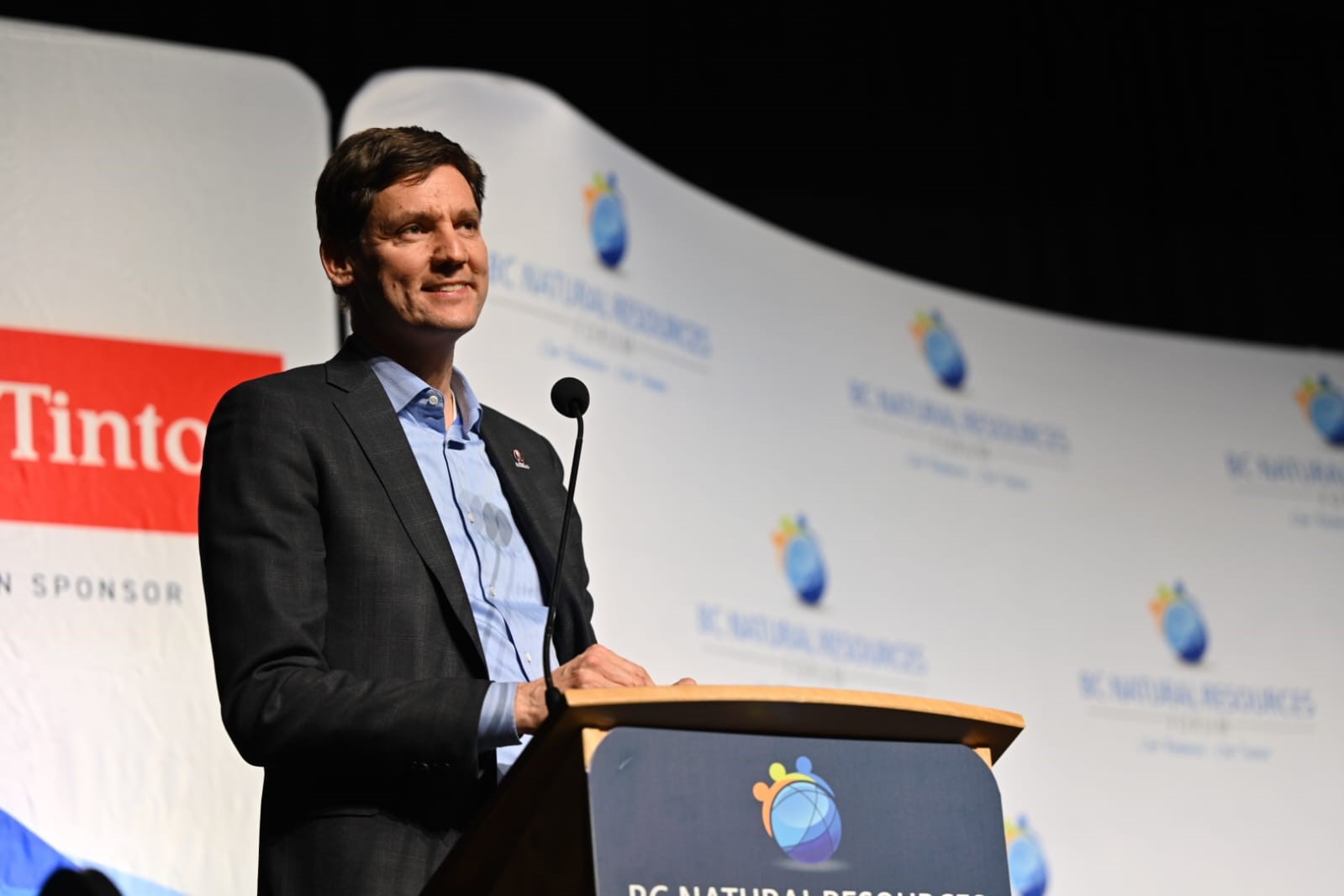Written by Scott Andrews
The sold out 2024 BC Natural Resources Forum wrapped up on Thursday in Prince George. The tone was much different from the 2023 Resources Forum where Premier Eby spoke to a sector he did not know well, after only a few months on the job. This time he was ready.
Premier Eby and six provincial cabinet ministers attended the event, along with a full entourage of senior civil servants. They were joined by over 1,200 delegates, First Nations leaders, industry leaders, technical experts, academics and professionals with decades of experience in the natural resource sector.
Stuffed in the premier’s briefcase was a news release announcing a $36 billion electrification plan for the province. The premier also visited the Canfor pulp mill in Prince George to join Chilliwack based Teralta Systems, who announced an innovative clean hydrogen system to reduce natural gas use at the Canfor mill.
While in Prince George, Premier Eby met with Chief Dolleen Logan of Lheidli T’enneh First Nation and announced funding for consultation on a northern centre of excellence for children and youth. Connecting the economic benefits of resource projects in the north with tangible benefits to First Nations and communities was a theme of the forum and central to the premier’s renewed commitment to attracting investment in the natural resource sector.
Reconciliation
The forum brought the point home that economic reconciliation with BC First Nations has completed its journey from aspiration to reality, through legislation brought forward by the provincial government.
The opening keynote address of the forum was from Chief Dolleen Logan and Councillor Crystal Gibbs of the host Lheidli T’enneh First Nation. The first panel featured three northern Indigenous leaders who stated unequivocally that “Canadian LNG is Indigenous LNG”. Panelist and Chief Councillor of the Haisla Nation Crystal Smith was granted an environmental assessment certificated for Cedar LNG, the first indigenous majority owned LNG project in the spring of 2023.
Electrification
On the opening night, delegates grumbled about the lack of provincial capacity to provide affordable, reliable electricity for communities and industrial projects. They wouldn’t have to wait long.
In his address to delegates on the second day of the forum, Premier Eby announced a $36 billion capital plan for B.C. Hydro, a $12 billion increase over the existing 10-year capital plan.
The resulting construction projects are projected to support 10,500 to 12,500 jobs and will increase and maintain B.C. Hydro’s capital investments as major projects like Site C come online.
The plan includes building new high-voltage transmission lines and supporting infrastructure from Prince George to Terrace; building and expanding substations and installing new equipment to support residential housing growth and transit electrification in high-growth areas and upgrading B.C.’s dams and generating facilities to make them safer, more reliable and more efficient.
In addition to the 10-year capital plan, Premier Eby announced the province and B.C. Hydro are implementing a new streamlined, one-window approval process to speed up approvals to get electricity to in-demand industries faster, and to support jobs.
Forestry sector in turmoil
While good news and momentum builds in other sectors, the forestry sector in B.C. continues to struggle.
Prior to the forum the president and CEO of the Council of Forestry Industries, Linda Coady, penned an op-ed highlighting the industry has lost of an estimated 4,500 direct jobs in the last two years due to the lack of access to predictable supply of B.C. timber. In his address to delegates, the premier recognized that the forestry sector is under immense strain as it undergoes a foundational transition in licensing, regulation, old growth protections and relationship with First Nations.
Just before the forum began, Premier Eby appointed Langley MLA Andrew Mercier as the minister of state for sustainable forestry innovation. In his speech he said that Minister of State Mercier will take charge of delivering fibre (trees) to forestry companies, but particularly those who add value and are able to create more jobs per tree harvested.
The premier was also able to highlight some progress and announced that the Carrier Sekani First Nation reached an interim agreement with B.C. Timber Sales to unlock 600,000 cubic meters of fibre in the Prince George Timber Supply area. Premier Eby also alluded to an investment that followed the next day from Minister of Jobs, Economic Development and Innovation Brenda Bailey of $8.6 million through the B.C. Manufacturing Jobs Fund to support six wood-product manufacturers and two fabricated-metal manufacturers.
Path forward
The 2024 BC Natural Resources Forum did not solve all the issues facing the natural resource sector, but industry, the provincial government and First Nations all showed leadership and agreed that together they can face challenges head on and attract must needed investment. B.C. remains a high-cost jurisdiction with many regulatory hurdles, but action is being taken and B.C. is open for business.
Politically, this was a breakthrough for the premier as he strives to show leadership in the resource sector. Neil Godbout, the editor of the Prince George Citizen said the premier stole BC United leader Kevin Falcon’s thunder with his bold announcements and policy initiatives. As Kevin Falcon unveiled his ‘Resource Prosperity Plan,’ he sounded “more like Trooper, while Eby – even in a ridiculous winter parka – came across as Metallica”. It remains to be seen whether this translates to electoral success in northern B.C., but we will find out with the next provincial election just nine months away.
